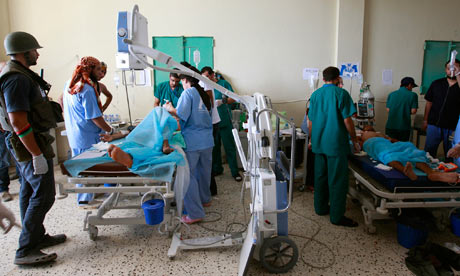
International Medical Corps medics treat injured rebel fighters at a field hospital near Misrata's frontline. The rebel city is struggling to pay for essentials.
Germany has announced that it will lend €100m to the Libyan opposition to ease a growing humanitarian crisis in rebel-controlled parts of the country.
The £88m loan to the national transitional council (NTC) was secured against frozen Libyan government funds. The money comes as the rebels struggle to pay for essentials, a fact that was exacerbated on Sunday when government missiles struck the oil tanks that fuel the besieged city of Misrata's power generators.
"We have decided to provide the NTC with urgently needed funding for civil and humanitarian measures," said the German foreign minister, Guido Westerwelle, in a statement. "People are suffering more and more from this, particularly in eastern Libya."
Five months into the war, cash is running low and the rebels have tried and failed to get access to billions of dollars held in Libyan government accounts.
The situation is most acute in Misrata, Libya's third largest city, whose only route to the outside world is by sea. The normally affluent city was well stocked with supplies when war broke out, with petrol tanks and grain silos full. But supplies are running low, along with the cash to pay for them.
Prices for goods ranging from clothes to fruit have skyrocketed in recent weeks. "You cannot pay for everything you need in Misrata now, you cannot pay for juice, the children must have fruit and we cannot pay for it," said Bashir Al Zawawi, a lecturer in business administration at Misrata University.
On Sunday, one of the four giant tanks holding the city's oil supplies was hit by three grad rockets fired from government lines, leaving a huge pall of smoke over the city.
The most acute shortages are felt in Misrata's battered hospitals. "We have a shortage of everything," Dr Khalid Abufalgha, head of the city's health council, told the Guardian. "We are receiving humanitarian aid but it is never enough."
The rebels say Qatar, one of their key backers, has offered an "air bridge" to fly in food and medical supplies fly out wounded, but only when it is safe to land at the airport. Engineers have cleared the runway of debris and cannibalised wrecked machinery to provide fuel and power for landing planes, but the government frontlines are too near to make landings safe.
"We need this airport," said the airport's director, Abdul Hamid Garwash. "From our side we're ready, but permission is needed from Nato."
Earlier this month the NTC spokesman, Abdul Hafiz Ghoga, complained that promises of payments from western donors in May remained unfulfilled. Western officials counter that payments are being held up because the NTC is unable to present a fully transparent accountancy system to allow funds to be checked, and to guarantee that money earmarked for aid is not used for weapons.
Nato remains outwardly confident that however bad things are for the rebels, they were worse for government forces, saying that weeks of bombing had inflicted significant damage on Muammar Gaddafi's Bab al-Aziziyah compound in Tripoli, where bombs reportedly hit early on Sunday morning.
"Gaddafi has for decades hidden from the Libyan people behind these walls," said Major General Nick Pope, spokesman for Britain's chief of the defence staff.
The Gaddafi government insists it remains open to a negotiated solution to the war, with spokesman Moussa Ibrahim saying Libyan officials had a "productive dialogue" with US officials last week.
Informal peace proposals will be canvassed this week by special UN envoy to Libya, Abdul Elah al-Khatib, a Jordanian senator. But the sticking point in any negotiations is likely to be the insistence of the US, UK, France and Russia that Gaddafi steps down as a precondition to talks, which Ibrahim said would be rejected.
